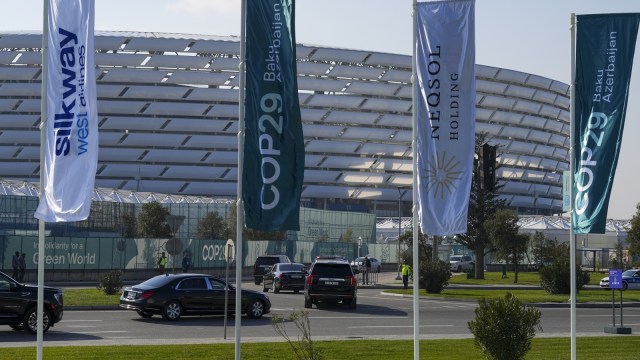Not at WTO, COPs, where do you want to discuss CBAM: India, China confront EU
China and India, along with other BASIC country partners Brazil and South Africa, have been complaining against the Carbon Border Adjustment Mechanism (CBAM) introduced by the EU last year.
 Outside the Baku Olympic Stadium, the venue for the COP29 UN Climate Summit in Azerbaijan. (AP)
Outside the Baku Olympic Stadium, the venue for the COP29 UN Climate Summit in Azerbaijan. (AP)China and India confronted the European Union (EU) once again on Friday on the issue of trade barriers disguised as climate action and warned that unilateral trade measures could be detrimental to multilateral cooperation.
China and India, along with other BASIC country partners Brazil and South Africa, have been complaining against the Carbon Border Adjustment Mechanism (CBAM) introduced by the EU last year. CBAM seeks to impose a tax on a certain class of goods imported in the EU, if the production of those goods had an emission footprint higher than the emission standards in EU. Ostensibly a step to control emissions, CBAM will have the effect of goods from developing countries like China or India becoming non-competitive in the European markets.
When European countries said that a climate change conference was not the appropriate forum to discuss trade-related issues, China Friday put forward officials who had raised this issue at the recent World Trade Organisation (WTO) meetings. Those officials reminded Europe that they had turned down the discussion at WTO meetings as well.
On the opening day of the COP29 meeting Monday, China, on behalf of the BASIC countries, had moved a proposal to include a discussion on “unilateral restrictive trade measures” — without mentioning CBAM — in the formal agenda of the COP meeting. The EU had strongly opposed the move, and decisions at COP are taken only by consensus. The COP presidency — the host country presides over the conference — had then referred the matter for informal presidential consultations — the first round was held Friday morning.
The BASIC group said CBAM unfairly targeted developing countries. Chinese and Indian negotiators also argued that it violated several provisions of existing international regulations related to both trade and climate change. The EU, however, denied that CBAM was aimed at any particular group of countries or was discriminatory.
The consultations remained inconclusive, and the COP presidency said another round would be convened next week. These consultations are unlikely to result in the issue of trade measures getting included on the formal agenda — the original demand of the BASIC countries — since the agenda once adopted at the start of the meeting is not altered. But the BASIC countries are keen to keep the issue alive.
Meanwhile, India once again insisted that the attempts by the developed countries to evade their responsibilities on climate finance would not be acceptable to the developing nations.
India was, in particular, referring to proposals about a bulk of climate finance flows in the coming years would be in the form of investments.
COP29 is hoping to deliver a comprehensive agreement on finance to enable greater flows of money for climate action. Called the New Cumulative Quantitative Goal on climate finance (NCQG), the expected agreement is supposed to mobilise at least a trillion dollars every year for climate action, through various sources. But India said this entire amount must be raised by developed countries to help the developing nations, as is their mandated responsibility under the UN Framework Convention and the Paris Agreement.
India’s point is that if investments in green projects are also counted as climate finance, this would partially, shift the burden of mobilising resources on the developing countries as they can be blamed for not creating the right conditions for attracting investments.
“NCQG cannot be changed into an investment goal when it is a unidirectional provision and mobilisation goal (in Paris Agreement) from the developed to the developing countries. Paris Agreement is clear on who is to provide and mobilise the climate finance — it is the developed countries,” India said, while speaking on behalf of Like Minded Developing Countries (LMDC).
- 01
- 02
- 03
- 04
- 05































